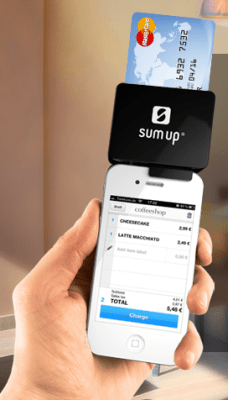The landgrab among Square-influenced mobile payment companies in Europe continues apace: in today’s development, SumUp — which launched in August with more than $20 million in backing from b-to-v Partners, Shortcut Ventures, Tengelmann Ventures and Klaus Hommels, the early Skype, Facebook and Xing investor — today is announcing that it is opening for business in Italy, Spain and The Netherlands, with sales offices opening in Milan, Madrid and Amsterdam. This takes the total number of markets covered by SumUp to seven, including the UK, Ireland, Germany and Austria. SumUp says that now has the largest international footprint of any of the mobile point-of-sale operators in terms of countries.
The news comes a day after iZettle announced that it was launching full services in Denmark, Finland and Norway. In recent weeks iZettle had also launched and announced key carrier partnerships in the UK (with 4G operator EE) and Germany (with Deutsche Telekom and DZ Bank). Another competitor, the Rocket Internet-backed Payleven, is meanwhile building out infrastructure to enable chip-and-pin based payments using keypads alongside its mobile-connected card readers. U.S.-based Square, meanwhile, recently made its first international move by enabling payments in Canada. And Verifone’s Sail has now landed in Europe to carve out a market for itself here, too.
One issue with all of these mobile payments companies is that it is relatively hard to differentiate one from another — like iZettle, Square, Payleven, Here, and the rest, SumUp is targeting the millions of small businesses that currently do not take card payments because they are either too small or lack the infrastructure. For all of them, a simple accessory that plugs into their mobile devices turns those handsets or tablets into point of sale devices. Among merchants, there seems to be little to distinguish one from the other: they even all accept similar commission rates: 2.75%, and both iZettle and SumUp are now offering a set of APIs to integrate their services into other apps.
It’s partly because of these challenges that SumUp CEO Daniel Klein is focused on moving “farther and faster” than the others in terms of rollout.
One of SumUp’s unique selling points — in addition to its geographic reach — is that its service has from day one (that is, 12 weeks ago) accepted both Visa and Mastercard payments. This has been an issue of contention for iZettle, which found that it had to withdraw Visa acceptance after Visa Europe said that it did not meet its security standards for user authentication.
SumUp’s workaround for this problem has been to redirect users to a web site to get them to enter card details there on their own phones. This happens to be what iZettle has also done to bring Visa into the fold again, as of yesterday.
As with iZettle, this is likely to be just an interim solution for SumUp, since making manual entries is a cumbersome process compared to the mobile-connected dongles’ card swipe/chip-reading systems. “We’re in discussions with Visa and have a really good relationship with them, which makes it easier,” says Stefan Jeschonnek, the MD and another co-founder of SumUp.
Another point of differentiation for SumUp has been the apps that it wraps around the point-of-sale hardware. Today, the company is announcing an upgrade to its iOS and Android apps that make it easier for merchants to create and manage “shelves” in the apps to make product and price selection easier when making a transaction. Along with that, the company has also upgrade search and indexing functions. SumUp says that the iOS version is now also optimised to work with the iPhone 5 screen size, although it has yet to integrate functionality such as the Passbook to accept vouchers or coupons for purchases.
SumUp has been mum so far on user numbers, except to note that it has had “several thousand registrations” and is “growing really fast” since launching 12 weeks ago. As with iZettle and others, SumUp is also working on partnerships to help distribute its dongles among businesses. Jeschonnek claims it has a “pretty large partner” lined up but declined to give more details.
